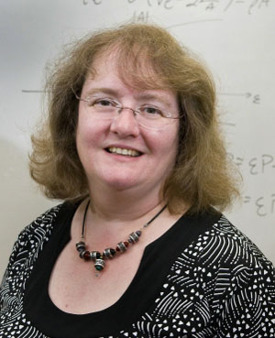Mathematics of Crime
Andrea Bertozzi
Thursday, 26 Mar 2015 at 7:00 pm – Sun Room, Memorial Union
Andrea Bertozzi is the Betsy Wood Knapp Chair for Innovation and Creativity and a professor of mathematics at the University of California at Los Angeles. She is an applied mathematician whose work includes geometric methods for image processing, crime modeling and analysis, and swarming dynamics. Her expertise is in nonlinear partial differential equations and fluid dynamics. Bertozzi completed all her degrees in mathematics at Princeton. She was an NSF Postdoctoral Fellow at the University of Chicago, the Maria Geoppert-Mayer Distinguished Scholar at Argonne National Laboratory, and was on the faculty at Duke University prior to UCLA. She was elected to the American Academy of Arts and Sciences in 2010. Sigma Xi Lecture Series.Abstract
There is an extensive applied mathematics literature developed for problems in the biological and physical sciences. Our understanding of social science problems from a mathematical standpoint is less developed, but also presents some very interesting problems, especially for young researchers. This lecture uses crime as a case study for using applied mathematical techniques in a social science application and covers a variety of mathematical methods that are applicable to such problems. We will review recent work on agent based models, methods in linear and nonlinear partial differential equations, variational methods for inverse problems and statistical point process models. From an application standpoint we will look at problems in residential burglaries and gang crimes. Examples will consider both "bottom up'' and "top down'' approaches to understanding the mathematics of crime, and how the two approaches could converge to a unifying theory.
Cosponsored By:
- Sigma Xi
- Committee on Lectures (funded by Student Government)
Stay for the entire event, including the brief question-and-answer session that follows the formal presentation. Most events run 75 minutes.
Sign-ins are after the event concludes. For lectures in the Memorial Union, go to the information desk in the Main Lounge. In other academic buildings, look for signage outside the auditorium.
Lecture Etiquette
- Stay for the entire lecture and the brief audience Q&A. If a student needs to leave early, he or she should sit near the back and exit discreetly.
- Do not bring food or uncovered drinks into the lecture.
- Check with Lectures staff before taking photographs or recording any portion of the event. There are often restrictions. Cell phones, tablets and laptops may be used to take notes or for class assignments.
- Keep questions or comments brief and concise to allow as many as possible.




